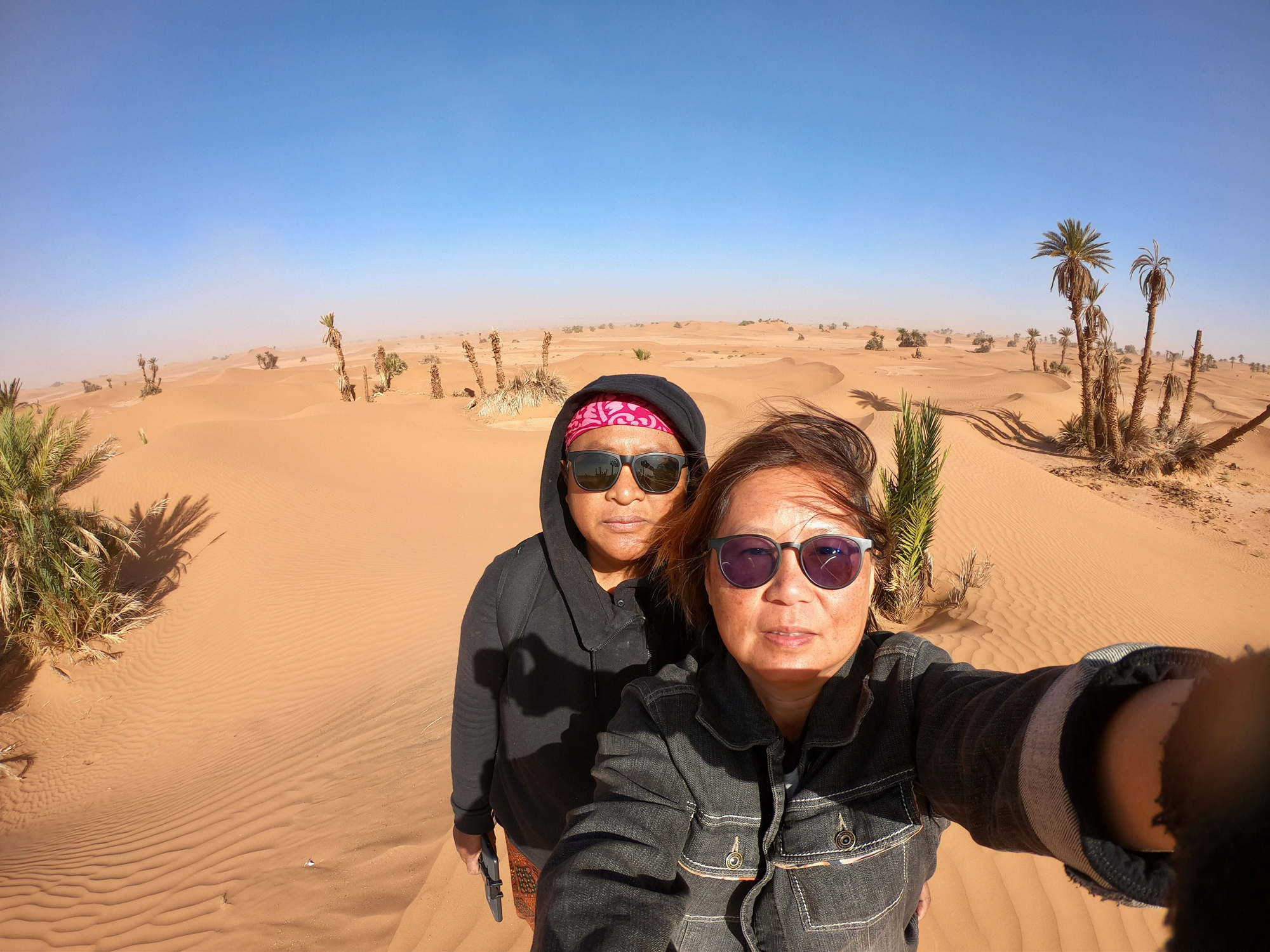Photos Courtesy of Two Travelling Aunties
It all started with a Swiss-plated Unimog parked on a dusty street corner in Borobudur, Indonesia. Susie Chua and Norah Soeb spotted the hefty home on wheels during a vacation back in 2018. “We had so many questions!” Norah exclaims. “Which countries did the vehicle need to cross to come all the way to Indonesia from Switzerland? Who actually lived in it? How did they do it? Could we do something like this?”
Born and bred in the tiny city–state of Singapore, Susie and Norah had traveled all over the world, doing the usual touristy thing or renting a car. But the Unimog represented something different. “As soon as we returned home, the search for information began,” Norah explains. “It was like an obsession. We researched vehicles, costs, and discovered vanlife and the many overlanding communities around the world. After realizing that so many people are living (like, really living) their lives while traveling full-time, the nine-to-five comforts of city living became less attractive to us.”
Currently, in Italy, Susie, Norah, and VanGar, the couple’s 23-year-old Dutch-plated Ford Transit motorhome, have been on the road for just over a year. The pair wants to challenge what it means to be an “auntie.” “In our Asian society, auntie means an older woman, usually of age 45 and above. In modern Singapore, being called an auntie is somewhat unflattering; a pejorative term applied to an older woman who is supposedly settled in life, busying herself with mundane everyday living as life has passed her by,” explains Susie. “We decided on the name Two Travelling Aunties to reclaim the meaning.” From learning how to cook, attending a Nomad’s wedding in the North African desert, cycling in a Saharan sandstorm, and spending 88 days of lockdown in Morocco, there’s definitely nothing mundane about Susie and Norah’s adventurous life on the road.

Once you discovered this type of travel was possible, what steps did you take to transform this concept into a reality?
Norah: In Singapore, this type of travel is super unusual. We didn’t know many people who had done something like this, and we didn’t know anyone who had traveled full time. Susie and I started to talk and expanded the discussion, asking, ‘Can we do this or not?’
From Singapore, of course, we travel throughout Asia or in popular spots like the US and Europe on long-haul flights. We thought, instead of one or two expensive holidays a year, maybe we pool finances and could afford to travel by vehicle. I started searching on YouTube, and one video led to another and another. One of the videos broke down finances, but at the end of the day, it depended on our own budget. The information in the videos gave us an idea of where and how to proceed from there. When we finally figured out that we could not only afford this kind of travel but also extend the adventure for a longer period of time, we were sold! The next process was figuring out the kind of vehicle we wanted.
Before deciding on a vehicle, you flew to Perth, Australia, and rented a Mercedes Sprinter van as a trial run. What did you learn from this experience?
Susie: Motorhomes are illegal in Singapore, so we had never been in one before. I was afraid we would get cabin fever, or the van would be too claustrophobic for us to live together. I didn’t even know if we would get along. So, we booked a ticket to Perth and rented the van for 10 days, traveling up the Great Ocean Drive in Western Australia to Coral Bay. We drove like 700 kilometres each day, from one campsite to another, and realized just how far the distance was. We learned that we definitely had to decrease our daily travel distance.
We learned a lot from this trip and really enjoyed it (and didn’t kill each other). We were quite confident about what we wanted and figured we could do it for a whole year or more. We also learned about the importance of good insulation, as the van we rented in Australia was really cold inside. After the trial run, we started looking for a setup with a table, a bed, a kitchen, a toilet, and big enough windows so we wouldn’t feel claustrophobic inside.
How did the 1996 Ford Transit motorhome become your vehicle of choice for the trip?
Susie: The plan was to travel the European Continent, the United Kingdom, Ireland, and then back to mainland Europe before heading out to North Africa. Then sell the motorhome in Europe and return to Singapore. We preferred a left-hand-drive European vehicle to a right-hand-drive British-plated vehicle, so that ruled out the UK. Germany has quite a big market, but we didn’t know the German language. The Dutch speak English, have a huge caravan culture, and there is a dealer there that both sells and repurchases campervans.
Norah: A lot of research was involved, including contacting the agents, resellers, and motorhome distributors in Europe. I sent out hundreds of emails. Many of the agents didn’t reply—I don’t think they believed someone from a far-off country was very serious about buying a motorhome. We considered all types of vehicles, including a four-wheel-drive Jeep, a van, a fifth wheel, or caravan, etc. In the end, budget won out over everything else.
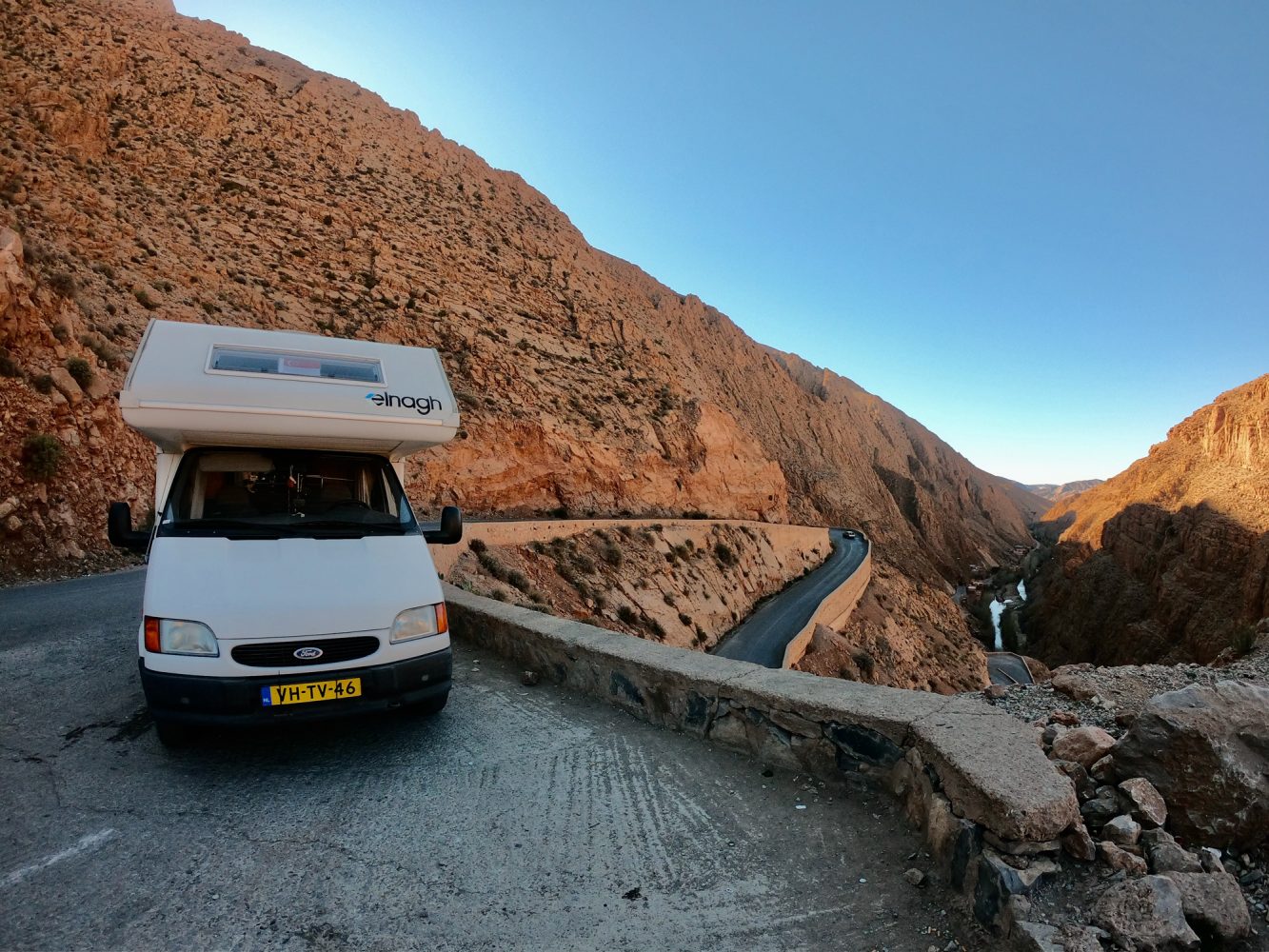
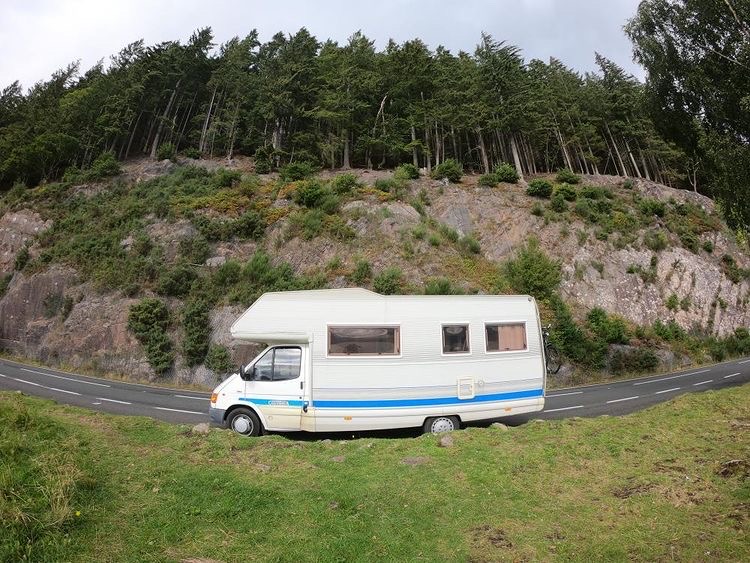
Tell us more about VanGar.
Norah: VanGar is short for Van Garang. Garang in the Malay/Indonesian language means fierce, fearless, and courageous, and this van has been our home since we set out on this adventure of a lifetime. We bought the 23-year-old manual 1996 Ford Transit diesel 2.5L turbo motorhome in the Netherlands. It has a full bathroom, kitchen, and enough space for two people to live on the road without killing each other. Although VanGar doesn’t have solar panels, we usually stay at one place for at most three days. Moving often keeps the battery running. We do wild camp, and the longest stretch so far was a week and a half.
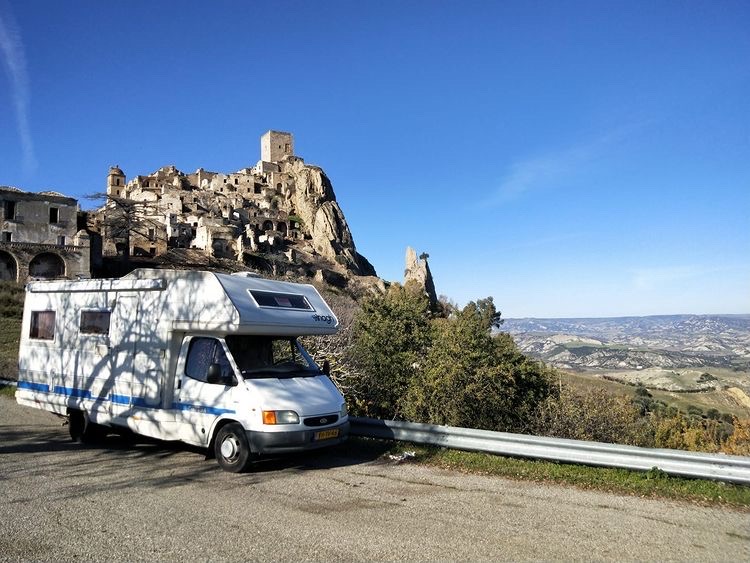
Did either of you possess any knowledge of basic vehicle mechanics prior to leaving on this trip?
Susie: Nope, we have zero knowledge. We don’t even change the oil ourselves. So far, we’ve been pretty lucky, and the only issue we had was a broken exhaust after about a year on the road. We are familiar with Europe, and it was safer to start there rather than in Singapore, heading to Malaysia, through the rest of Asia. We know that route is very challenging with tough roads to start out on. This was another reason we started the trip in Europe. We bought a roadside assistance membership, and we feel the amazing support of the vanlife and motorhome culture here.
Norah: When we bought the motorhome, we made sure to drive it around for a good three days to gain confidence in it. The guy who sold it to us was really trustworthy and knowledgeable. It’s also an older vehicle with no modern electronics, so any mechanic can fix it. I was recently wondering what we would do if we get a tire puncture in Mongolia or Russia. If we wait for someone to come and help, we might be there for a while, so I started watching YouTube videos on how to repair tire punctures. We’ll have to keep our fingers crossed and hope we won’t break down in the middle of the desert.
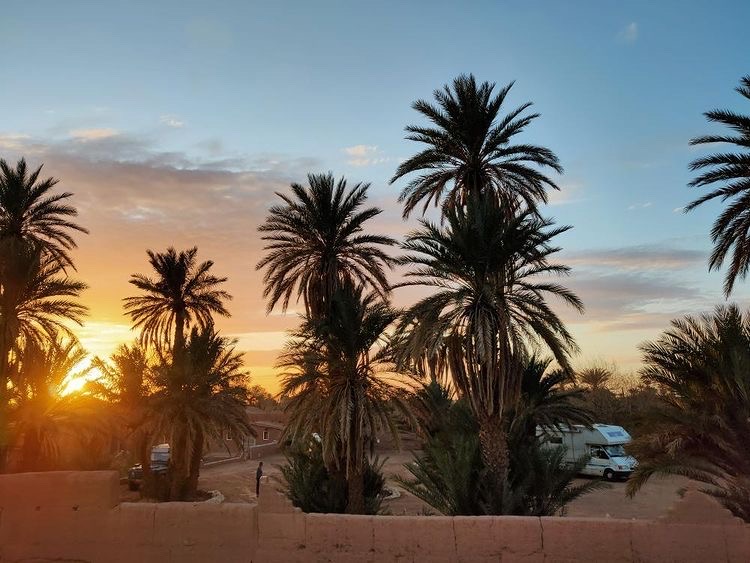
The Singaporean passport is the second most powerful in the world, with visa-free access to 190 destinations. Why do you think this is, and how does this impact your travels?
Susie: Singapore is a very tiny and relatively new country known for its diplomacy and fairly neutral stance during conflict. The officials at customs in Europe and Morocco were always saying, “You’re the first from Singapore to check in!” Even in Albania, they said that at the border. But there aren’t any borders amongst the European Union, so it has been fairly easy. We were inquiring about Iran, actually. Apparently, American-made motorhomes are not allowed to enter the country.
Norah: We’re pretty obsessed with the idea of driving VanGar back to Asia, perhaps through Turkey or via the Silk Road. We plan to continue our journey back to the Far East and drive to Malaysia. Not having to apply for visas along the way will be very helpful, especially as we are now posed with the new challenges of traveling during this pandemic.
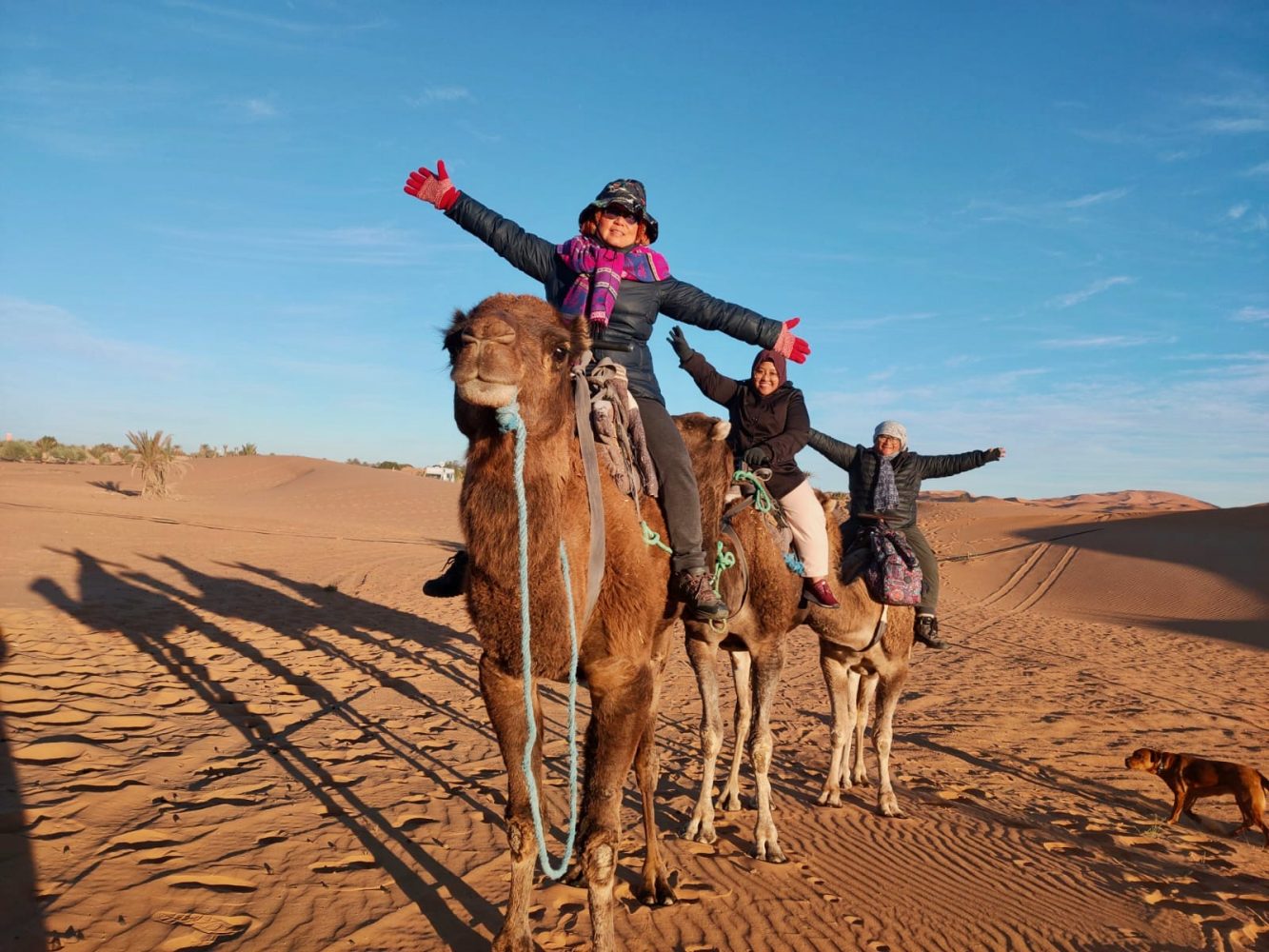
You both learned how to cook on this trip. How did this come about?
Susie: Singapore has a culture of eating out, so not many of us cook. Most apartment blocks have a coffee shop downstairs and stores that sell different kinds of noodle or rice dishes. In Singapore, the street food and food courts are pretty cheap. You can order a plate of noodles for less than five bucks. On the way home, we could easily pop into one of these places to pick something up, so we never needed to cook at all.
Norah: The main thing is to be brave enough to try and not think that you suck at cooking. Like everything else in vanlife, you learn to make the best simple stuff. Again, YouTube is essential. We do have our basic spices, like curry powder and salt. Being Asian, soy sauce is very important. So, we just started with those basic ingredients and learned how to make a few dishes.
What are some meals you’ve been making on the road?
Susie: Fried rice and fried noodles for sure, but Norah learned to cook tagine in Morocco and crêpes and French toast from our German and French friends that we meet at campsites. Sometimes we’ll go around and ask, “What’s your recipe? What are you cooking? Can I learn?” Our fellow campers share their recipes with us, so we learn a few things from them.
Norah: I am YouTube obsessed. We recently rented an apartment in Albania, and I’ve been using the oven a lot because it’s kind of a luxury. I learned to make pizza. These days, I like to cook Korean dishes because they can be very simple.
Susie: Norah learned to make Korean pancakes and gyoza from YouTube. She also learned to make roti paratha, which is a kind of Indian bread that is very common in Singapore. We missed it so much that we asked Norah’s sister how to make it. So now whenever I miss it, she will cook roti for breakfast for me.
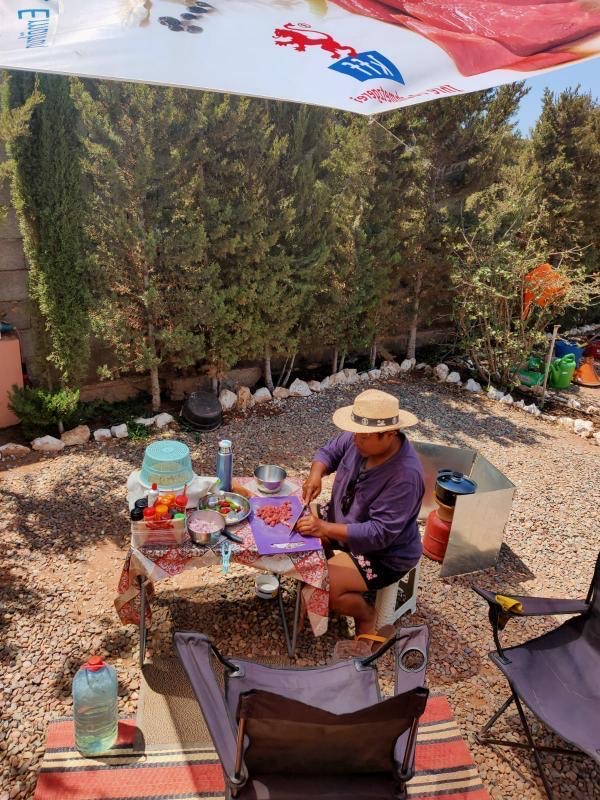
Are there any other foods that you miss from home?
Norah: If we miss Asian food, we go to Asian restaurants, but after a while, we found they are not as good as the ones back home, and we might as well try to make it ourselves. After you practice a lot, your own cooking becomes better than the restaurants here, so you save money on that. The tricky part with recipes from back home is we don’t have access to the spices that make the dish different. Certain kinds of leaves and roots like tamarind and lemongrass are needed for that distinct flavor and smell. Also, the curry powders from home taste different from the ones in Europe. They are similar to those found in India, which have a heat to them. I miss Assam fish, which is made with hot pepper and tamarind. We tried to make it, but it tastes a little bit different. I also miss Japanese food. The Japanese restaurants are more expensive in Europe than back home.
Susie: I miss roast duck, chicken rice, satay, Japanese noodles, sushi, coconut rice. We have many, many different kinds of noodles in Singapore, so I miss those a lot. But we have discovered some good food in the Balkans. You can buy half a kilo of fresh, fried fish from the monger in Albania, and it’s delicious.
What do you think is the biggest challenge for women overlanders? The biggest advantage?
Norah: As women traveling on our own, we are often subjected to unwarranted attention from men. We have to assess quickly if a certain look is a harmless and curious one or a menacing one. Constantly being aware and cautious of our surroundings—that can be exhausting!
Susie: The biggest advantage would be that people are more willing to help. When we come into contact with other women, they are often friendlier and have offered us food or [an invitation] into their homes and kitchens. People also see us as less of a threat.
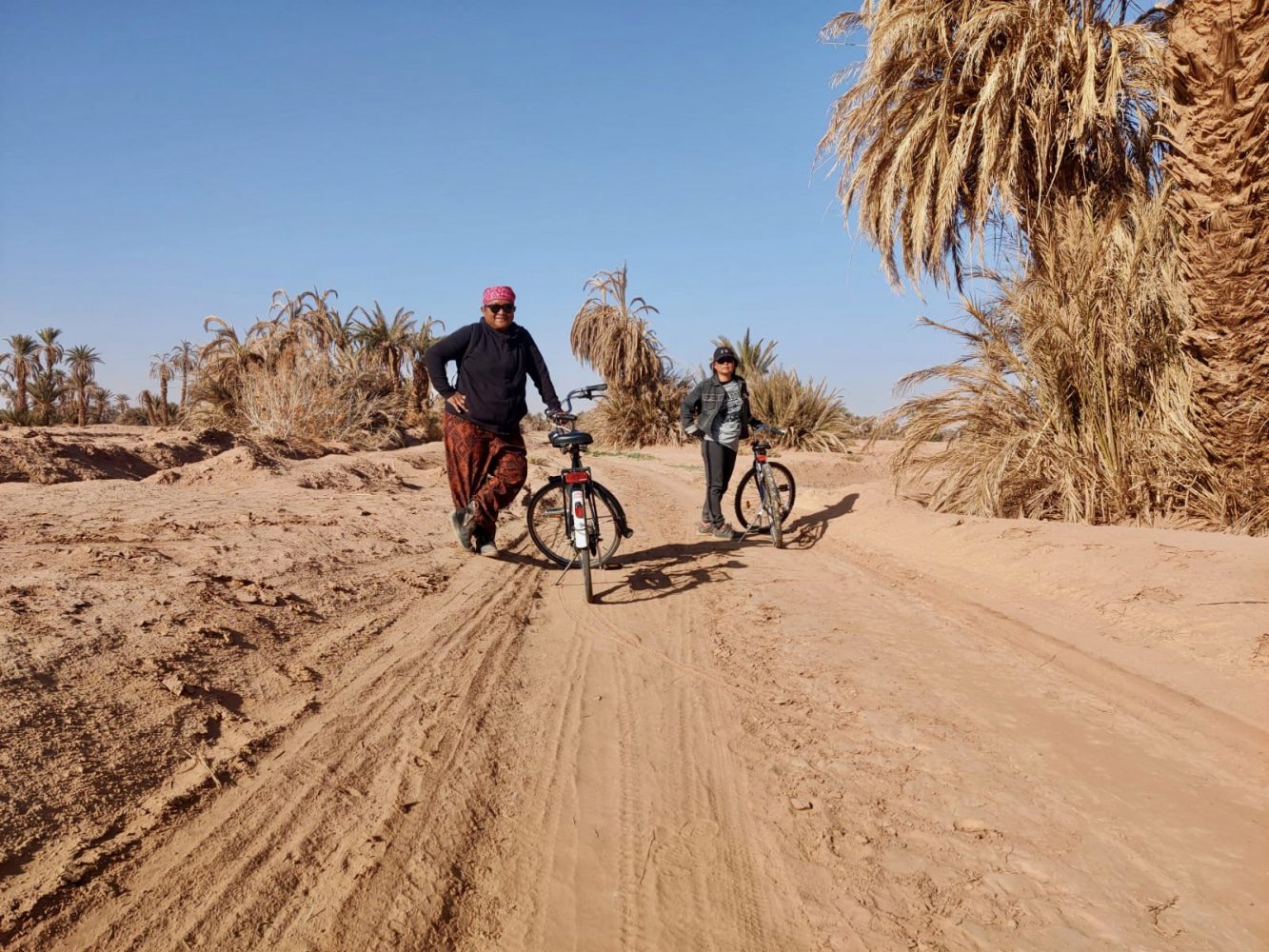
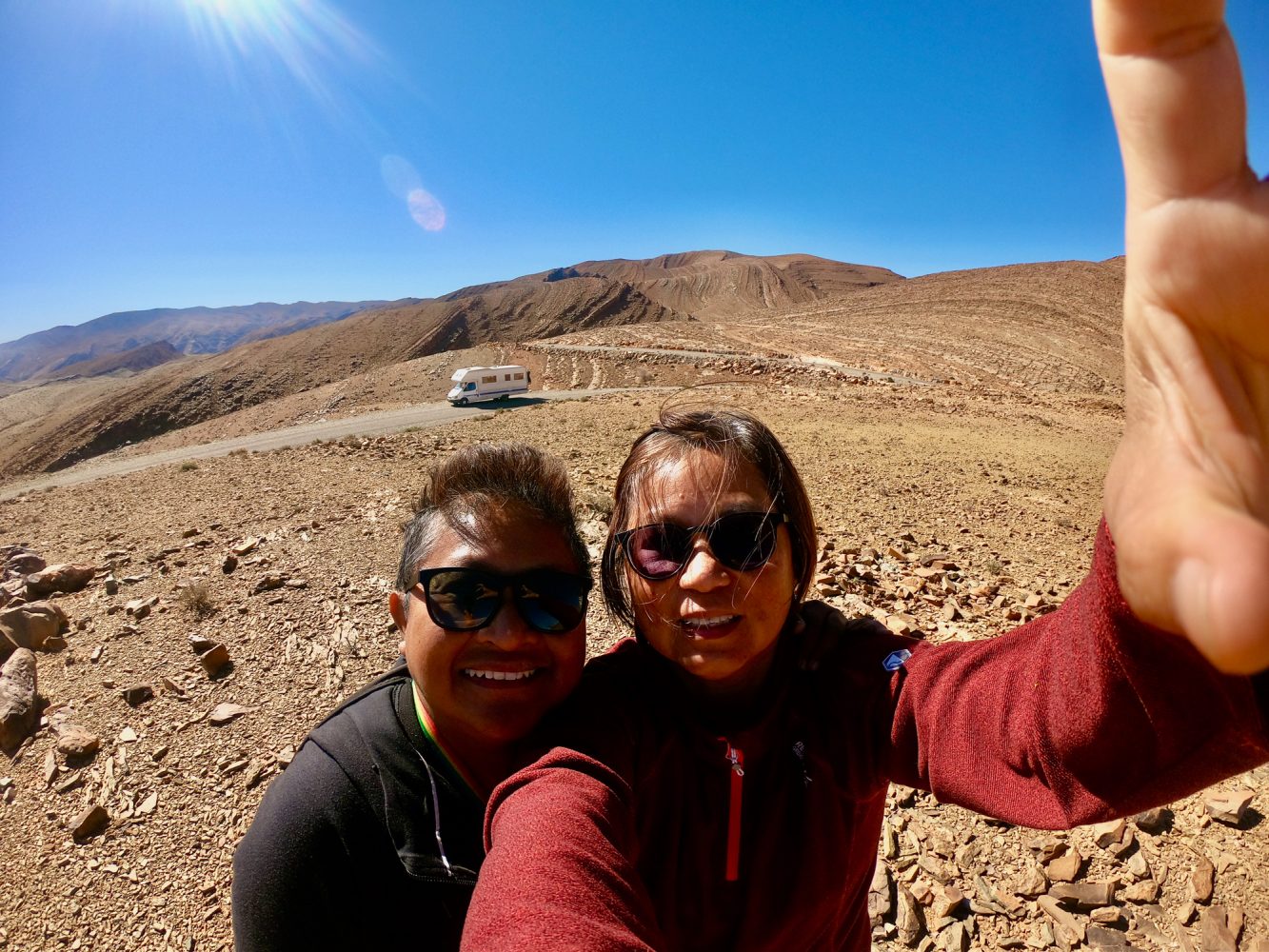
What are some of the realities of overlanding as a gay couple?
Susie: Some people ask, ‘Are you friends? Are you sisters?’ Some locals in Morocco saw our rainbow lanyards and asked, “Oh, are you two a couple?” It seems like the younger generation is more receptive. Before we left, we sat down and discussed such situations and more or less prepared what to say. We say we’re good friends who travel together.
Norah: In Macedonia, the immigration officer asked us what our relationship was. It was a little bit scary because the inspection was stricter than most countries, and the question caught us off guard. After 21 countries, that was the only one where an immigration officer asked. We are extra careful, even in Europe, to minimize P.D.A.
In Morocco, it became quite irritating for me because Susie had already received three marriage proposals. We were camping in the Sahara, and a local man offered 30 camels for her dowry. Another took out his passport photo from his wallet and wanted hers in exchange, and he tried to hug and kiss her, which was a nuisance. We learn to walk away.
Susie: I will sometimes research the places we are traveling through to check if they are LGBTQ-friendly or not. Overall, we’ve had no issues.
Norah: I also think you should choose your battles. As proud as we are, it’s also about respecting the people and the culture we are visiting. We’re visitors just passing through. I say safety first, be respectful, and be on your way.
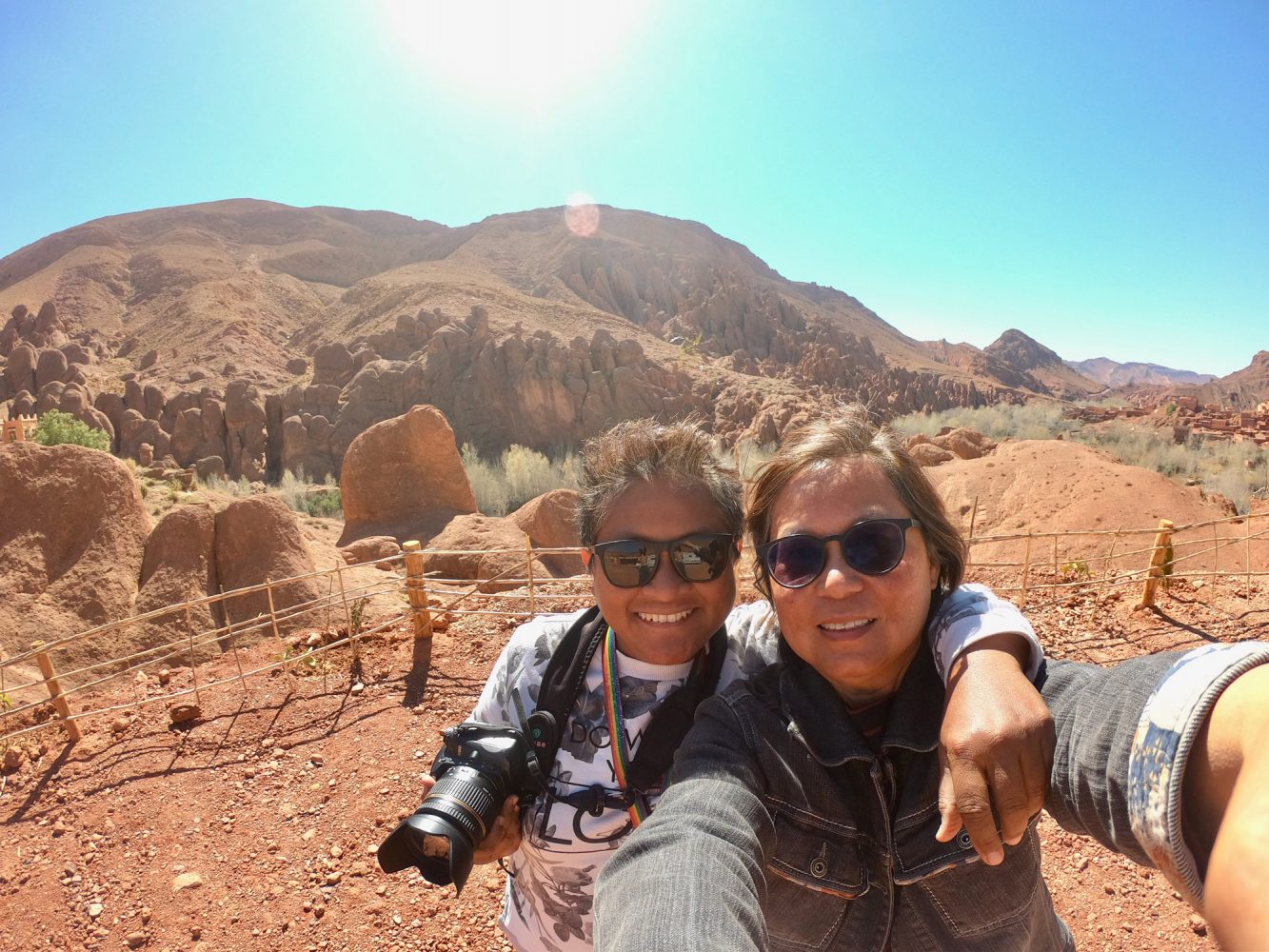
Everyone always asks a traveler what their favorite country is. Do you have a favorite country? If not, what is a place that is special to you?
Norah: It seems that every country that we traveled to is a favorite. But what makes it special is the experience we have at a particular place, with people we meet and, of course, the food.
One special country is Morocco. In the first three months of our travels there, we crossed the beautiful Atlas mountain three times and drove the amazing and challenging Dadès Gorges, though greens valleys and bare mountain roads. We rode on dromedaries, camped in the Sahara Desert, and watched BOTH the sunset and sunrise over the dunes. That was truly magical. On another occasion, we cycled through a sandstorm in the Sahara. We were invited to a Nomad wedding, walked more than 8 kilometres one way, were served meat and bread on bare tables, and ate with our hands in the mountains near Tamtetoucht in the Tinghir Province.
We had just finished our three-month tour of Morocco when the COVID-19 pandemic happened. We were stuck there for another three months, confined in a campground with 100 other people, 99 percent of them [were] French. Almost seven months in Morocco makes the country extra special, don’t you think?
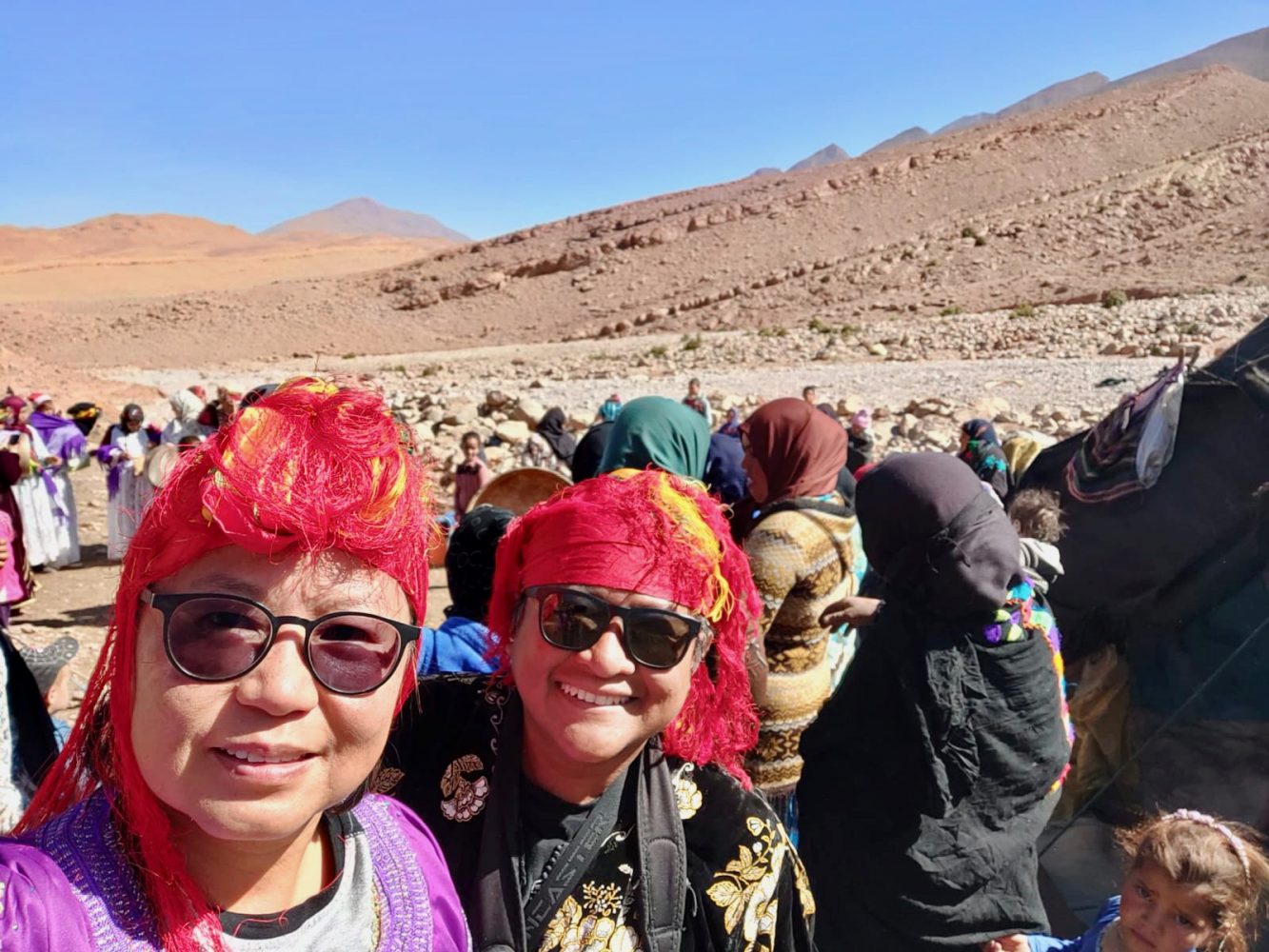
How has this experience changed you?
Susie: It has taught us to be more responsible, more thoughtful of others and our surroundings. Appreciating our symbiotic existence that makes us stronger together. We’re ecologically more conscious; we look for spring water rather than buying bottled water from the supermarket whenever we can. We also realized that we could live with so much less. Materialism is not what we are meant to achieve. We’ve learned to enjoy Mother Nature and the pleasure of watching the same sun rising. Appreciate life and live it. Enjoy the journey, as every experience counts.
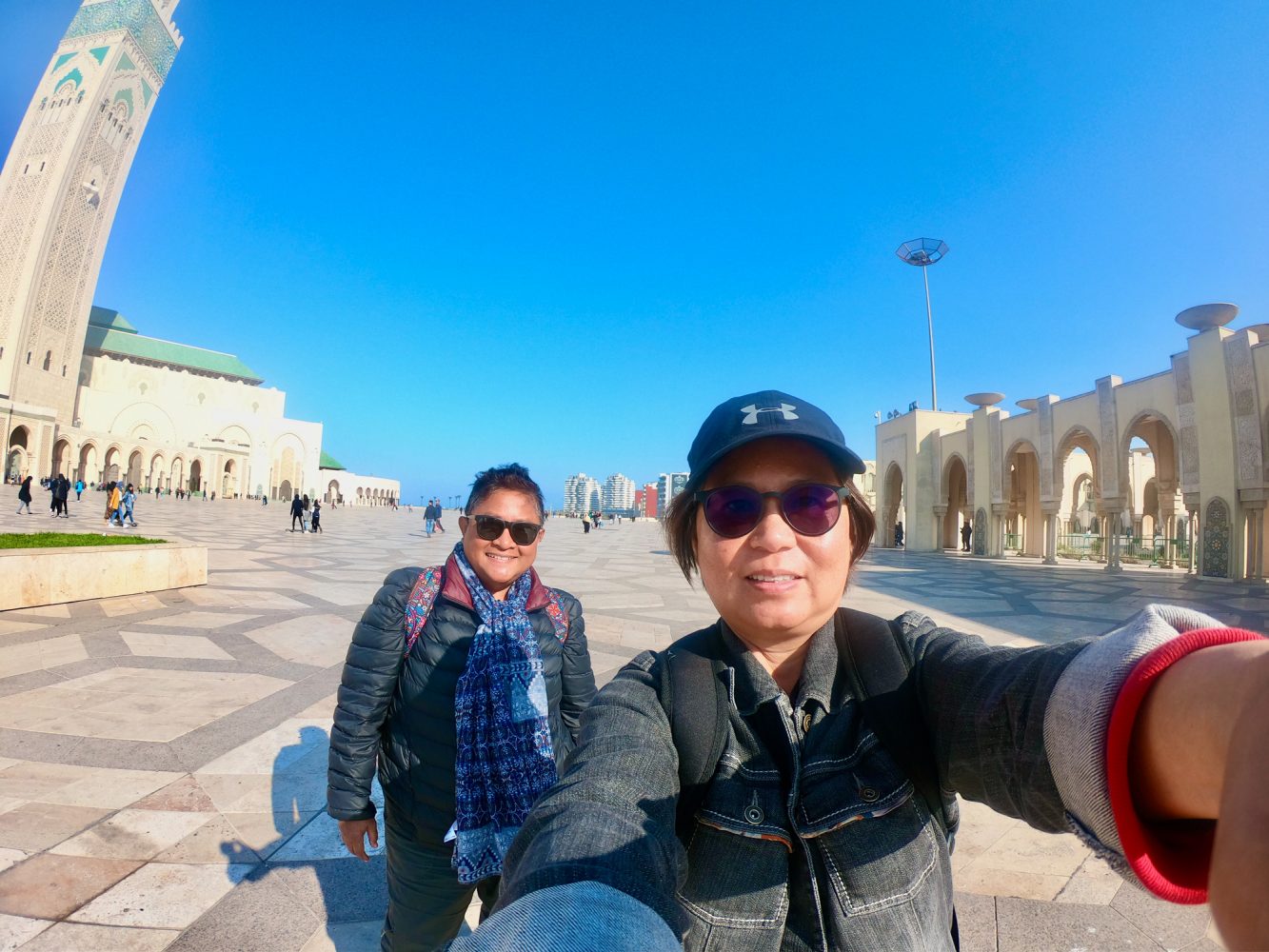
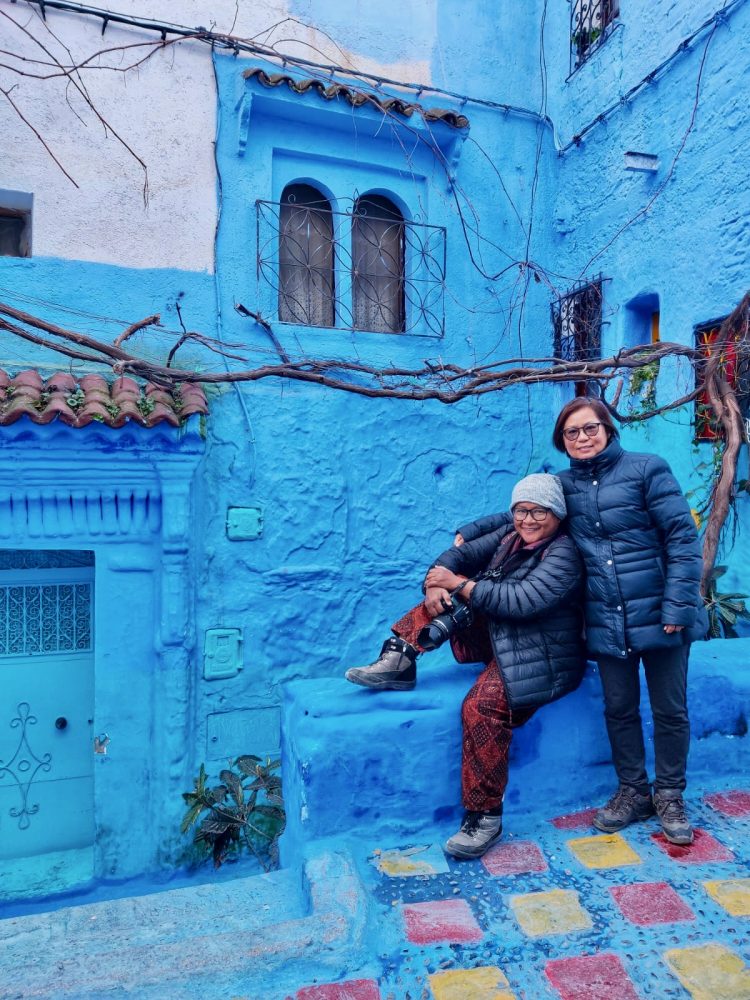
Our No Compromise Clause: We carefully screen all contributors to make sure they are independent and impartial. We never have and never will accept advertorial, and we do not allow advertising to influence our product or destination reviews.


